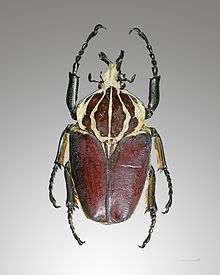Definify.com
Webster 1913 Edition
Beetle
Bee′tle
(bē′t’l)
, Noun.
1.
A heavy mallet, used to drive wedges, beat pavements, etc.
2.
A machine in which fabrics are subjected to a hammering process while passing over rollers, as in cotton mills; – called also
beetling machine
. Knight.
Bee′tle
(bē′t’l)
, Verb.
T.
[
imp. & p. p.
Beetled
(-t’ld)
; p. pr. & vb. n.
Beetling
.] 1.
To beat with a heavy mallet.
2.
To finish by subjecting to a hammering process in a beetle or beetling machine;
as, to
. beetle
cotton goodsBee′tle
,Noun.
Any insect of the order Coleoptera, having four wings, the outer pair being stiff cases for covering the others when they are folded up. See
Coleoptera
. Beetle mite
(Zool.)
, one of many species of mites, of the family
– Oribatidæ
, parasitic on beetles. Black beetle
, the common large black cockroach (
Blatta orientalis
).Bee′tle
,Verb.
I.
[See
Beetlebrowed
.] To extend over and beyond the base or support; to overhang; to jut.
To the dreadful summit of the cliff
That
That
beetles
o’er his base into the sea. Shakespeare
Each
beetling
rampart, and each tower sublime. Wordsworth.
Definition 2026
Beetle
Beetle
See also: beetle
English
Alternative forms
- beetle (uncommon)
Noun
Beetle (plural Beetles)
- A small car, the Volkswagen Beetle (original version made 1938–2003, similar models made 1997–2010 and since 2011)
Synonyms
Translations
Volkswagen car
|
beetle
beetle
See also: Beetle
English

A beetle.
Alternative forms
- bittle, betel, bittil (all obsolete)
Noun
beetle (plural beetles)
- Any of numerous species of insect in the order Coleoptera characterized by a pair of hard, shell-like front wings which cover and protect a pair of rear wings when at rest.
- (uncountable) A game of chance in which players attempt to complete a drawing of a beetle, different dice rolls allowing them to add the various body parts.
- 1944, Queen's Nurses' Magazine (volumes 33-35, page 12)
- Guessing competitions were tackled with much enthusiasm, followed by a beetle drive, and judging by the laughter, this was popular with all.
- 1944, Queen's Nurses' Magazine (volumes 33-35, page 12)
- Alternative letter-case form of Beetle (“car”)
- For usage examples of this term, see Citations:beetle.
Synonyms
- (insect): bug (U.S. colloquial)
Derived terms
from beetle
Translations
insect
|
|
See also
Verb
beetle (third-person singular simple present beetles, present participle beetling, simple past and past participle beetled)
- To move away quickly, to scurry away.
- He beetled off on his vacation.
- 1983, Dorothy L. Sayers, Gaudy Night, Mountaineers Books, ISBN 978-0-380-01207-7, page 144:
- “ […] But he seems to have beetled off somewhere as usual. […] ”
- 2003, J. K. Rowling, “The Department of Mysteries”, in Harry Potter and the Order of the Phoenix, ISBN 9780439358064, page 766:
- In the falling darkness Harry saw small collections of lights as they passed over more villages, then a winding road on which a single car was beetling its way home through the hills. …
- 2005, James Doss, The Witch's Tongue, ISBN 9780312991081, page 178:
- Her eyes still closed, his aunt smiled cruelly. “I know what you are dying to say, Bertie. Go ahead—take the cheap shot. I’ll squash you like the nasty little bug you are.” ¶ Thus chastened, the little man beetled away.
Etymology 2
From Middle English bitel-brouwed (“beetle-browed”). Possibly after beetle, from the fact that some beetles have bushy antennae.
Adjective
beetle (comparative more beetle, superlative most beetle)
- Protruding, jutting, overhanging. (As in beetle brows.)
Verb
beetle (third-person singular simple present beetles, present participle beetling, simple past and past participle beetled)
- To loom over; to extend or jut.
- The heavy chimney beetled over the thatched roof.
- Shakespeare
- To the dreadful summit of the cliff / That beetles o'er his base into the sea.
- Wordsworth
- Each beetling rampart, and each tower sublime.
- 1858 January-March, Dean of Pimlico, “A Story for the New Year”, in Dublin University Magazine reprinted in Littell's Living Age, volume 56 (volume 20 of the second series), Littell, Son & Company, page 63:
- I was indeed gently affected, and shared his fears, remembering well the bulging walls of the old house, and the toppling mass of heavy chimney work which beetled over the roof, beneath which these poor doves had made their nest.
- 1941, Chapman Miske, The Thing in the Moonlight:
- Impelled by some obscure quest, I ascended a rift or cleft in this beetling precipice, noting as I did so the black mouths of many fearsome burrows extending from both walls into the depths of the stony plateau.
Etymology 3
Middle English betel, from Old English bīetel, akin to bēatan (“to beat”)
Noun
beetle (plural beetles)
- A type of mallet with a large wooden head, used to drive wedges, beat pavements, etc.
- A machine in which fabrics are subjected to a hammering process while passing over rollers, as in cotton mills; a beetling machine.
- (Can we find and add a quotation of Knight to this entry?)
Translations
mallet
|
|
Verb
beetle (third-person singular simple present beetles, present participle beetling, simple past and past participle beetled)
- To beat with a heavy mallet.
- To finish by subjecting to a hammering process in a beetle or beetling machine.
- to beetle cotton goods